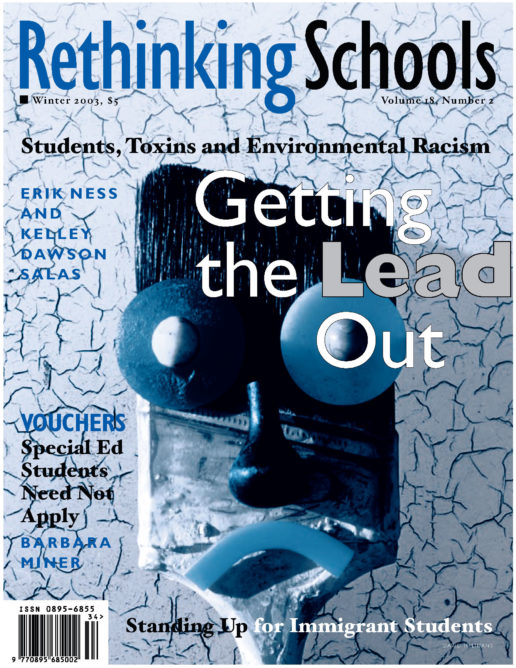Letters
Kudos for New Look
The Fall 2003 issue is superlative! The journal format is attractive and easy to read. I especially appreciated the two articles on teaching math for social justice by Bob Peterson and Eric Gutstein. Math is often considered to be abstract, unrelated to people’s real concerns.
Thanks for the brief review of my new book, More Math Games and Activities from Around the World . However, it is somewhat misleading to say that the activities are only from “Africa, South America, and Asia.” North and Central America and Europe are equally represented, while several activities deal with world issues-preservation of the environment and saving children’s lives through UNICEF.
Claudia Zaslavsky
New York, New York
Don’t Forget Reading
Linda Christensen recommends some excellent practices in “The Politics of Correction” (Vol. 18, No. 1). Informing students about the highly structured and complex grammar and the history of African-American Vernacular English (AAVE) is an excellent means of increasing appreciation and respect for this language.
I have, however, a suggestion that should make the job of adding “Standard English” to the students’ repertoire much easier: massive free voluntary reading. There is consistent evidence that those who read more have a better writing style and better control of grammar and the conventions of writing. Studies also show that they do better on tests of science, history, literature, and even “practical knowledge.”
In addition, research over the last hundred years confirms that formal grammar study and correction, whether done by teachers or peers, has limited impact on writing accuracy. Massive reading is the only way writers can absorb (or acquire) the vast number of rules of the [Anglo] standard, rules that are sometimes very complex and that have only recently been discovered by grammarians. Also, many rules of AAVE have only recently been discovered, and are very subtle and complicated. Many speakers of AAVE have managed to acquire Standard English to high levels without this knowledge. They did not do this through study and correction, but though voracious reading.
Richard Wright, for example, specifically credits his reading for the development of his writing ability: “I bought English grammars and found them dull. I felt that I was getting a better sense of the language from novels than from grammars,” ( Black Boy ). Malcolm X became a dedicated reader in prison: “In every free moment I had, if I wasn’t reading in the library, I was reading on my bunk. You couldn’t have gotten me out of books with a wedge . . .” ( The Autobiography of Malcolm X ) Like Richard Wright, Malcolm X gives reading the credit: “Not long ago, an English writer telephoned me from London, asking questions. One was, ‘What’s your alma mater?’ I told him, ‘Books.'”
Stephen Krashen
Malibu, California
Good Work!
I wanted to tell you how proud I am of the work you have done. Who ever thought you would grow in this way? I remember the early days when Rethinking Schools was a dream. This work is amazing, particularly because you have managed to stay so classroom based.
Janice Jackson
Chestnut Hill, Massachusetts
We the People
I ‘m writing to alert your readers to the “We the People” project jointly sponsored by the National Endowment for the Humanities and the American Library Association. Part of this project includes a “Bookshelf” of 15 books that are supposed to exemplify courage. Schools can submit a proposal to NEH that describes how they will use the books. They will then receive the set of books. The problem lies with the list of books itself. Latinos and Asians are completely missing from this list, and it includes two very old books that portray Native people in racist ways: The Matchlock Gun and Little House on the Prairie . If you want to see the project website, here is the url: www.wethepeople.gov/bookshelf/guidelines.html.
Debbie Reese
Champaign, Illinois
Write Us a Letter
Rethinking Schools welcomes letters to the editor. We reserve the right to print letters in condensed form.Send letters to:
Letters to the Editors
Rethinking Schools
1001 East Keefe Avenue
Milwaukee,WI 53212
or e-mail: feedback@rethinkingschools.org.

